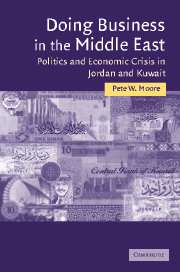Book contents
- Frontmatter
- Contents
- Acknowledgements
- Note on transliteration and translation
- 1 Summers of discontent: business–state politics in the Middle East
- 2 Organizing first: business and political authority during state formation
- 3 Politics and profits
- 4 Crises at century's end
- 5 Is business the solution?
- Appendix Comparative associational data
- Select bibliography
- Index
- Cambridge Middle East Studies 19
4 - Crises at century's end
Published online by Cambridge University Press: 22 September 2009
- Frontmatter
- Contents
- Acknowledgements
- Note on transliteration and translation
- 1 Summers of discontent: business–state politics in the Middle East
- 2 Organizing first: business and political authority during state formation
- 3 Politics and profits
- 4 Crises at century's end
- 5 Is business the solution?
- Appendix Comparative associational data
- Select bibliography
- Index
- Cambridge Middle East Studies 19
Summary
Easy money and regrets in Kuwait
The economic historian David Landes best summed up the precariousness of the rentier state: “Easy money is bad for you. It represents short-run gain that will be repaid for in immediate distortions and later regrets.” In the case of Kuwait, what we see is a state beset by two fiscal crises: an externally imposed decline in oil rents and an internally generated fiscal collapse brought on by the crash of the Souq al-Manakh. Exacerbating the money problems were persistent regional security issues arising from the 1980–1988 Iran–Iraq war. These pressures culminated in the Iraqi invasion and coalition liberation of Kuwait in 1990–1991. If the fiscal crises of the 1980s had not already laid bare state vulnerability, then certainly Iraq's invasion did so. For Kuwaiti business, the decades of the 1980s and 1990s offered great economic peril but also significant opportunity to recast its relations with political authority. How it did so and the ensuing political ramifications challenge accounts of business–state relations based solely on structural incentives.
Turning to Olson's framework, we should expect Kuwait's non-encompassing business representation to respond to exogenous economic shocks by advancing particularist, protectionist policies. No doubt there is evidence of such rent protection during crisis, but this is a limited view. The wider political and economic consequences from Kuwait's crisis and the creation of what in many respects came to resemble a new business–state coalition follow in previous trajectories and flow from institutional features absent in the Olson schema.
- Type
- Chapter
- Information
- Doing Business in the Middle EastPolitics and Economic Crisis in Jordan and Kuwait, pp. 120 - 175Publisher: Cambridge University PressPrint publication year: 2004

